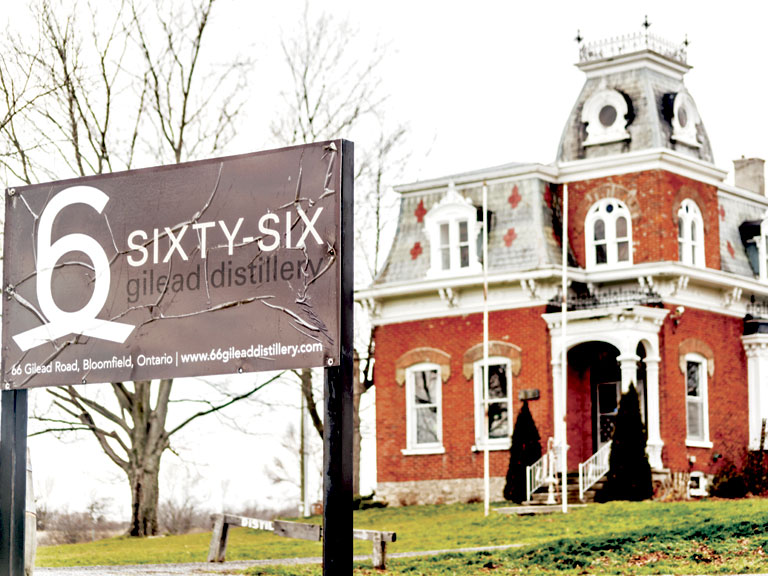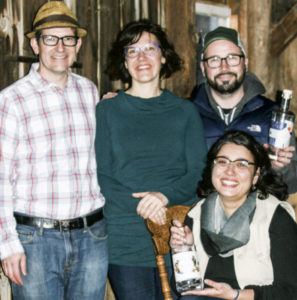County News
Making spirits bright

Proposed tax change a good first step, but more tweaking is needed for craft distilleries to thrive
When Sophia Pantazi and Peter Stroz opened 66 Gilead, a craft distillery just north of Bloomfield, they were excited to join a small but burgeoning market of makers of small-batch spirits.
It didn’t take long for the couple to discover themselves tangled in red tape and navigating complex, pricey taxes that left them either pricing themselves out of their market or barely turning a profit.
The government was taking more from each bottle they sold at their tasting room in the majestic Victorian farmhouse on Gilead Road than they did. Still they were hobbled by regulation at every turn.
Currently, if a Wellington restaurant wants to carry one of Gilead’s spirits, the bottles must be ordered through the LCBO. That means the distillery must send those bottles to the LCBO depot in Whitby, at its own expense, and then the LCBO will ship them to the restaurant, a completely unnecessary trip.
And if a restaurateur in the County visits the distillery and discovers a liquor they’d like to carry, but that product is not listed with the LCBO, they can’t simply buy the bottle and bring it to their restaurant. They can’t do anything, in fact.
Of the two 66 Gilead spirits approved to be listed with the LCBO, the owners saw only 27.5 per cent of the value of each bottle.
They were passionate about their work, and about the value of craft spirits over the commercial stuff.

(L-R): Michael Waterston, Sarah Waterston and Jeremiah Soucie with Maria Hristova, seated in front are the new owners of 66 Gilead north of Bloomfield.
Earlier this year, after a valiant attempt to lobby for changes to counterproductive provincial policies along with Ontario’s handful of other craft distillers, Pantazi and Stroz had had enough. They put their business and their farmhouse on the market.
Earlier this year, Sarah Waterston purchased the distillery with her brother, Jeremiah Soucie, who will be the company’s distiller, and their spouses, Michael Waterston and Maria Hristova. The two couples are in the process of rebranding the distillery as Kindred Spirits.
Along with the rebrand, they have a more ambitious goal—ensuring their line of spirits are available more widely in restaurants and through the LCBO. They recognize the challenges, and are working the the Ontario Craft Distillers Association to lobby for the changes needed to make local distilleries more viable.
At the moment, 66 Gilead’s Loyalist Gin is the only product available through the Ontario liquor seller, and that means it’s also the only product restaurants can offer.
“Right now, bars and restaurants have to go through the LCBO,” says Waterston. “It can sometimes be a challenge for craft breweries to be listed in the LCBO, and if they’re not listed in the LCBO, then there’s no mechanism to sell to restaurants and bars.”
In omnibus bill 70, which came into force last week, the province changed the way distilleries are taxed, simplifying the way retail taxes are calculated, increasing—slightly—the amount distilleries may keep from on-site sales.
For example, before the law changed distillers were allowed to keep $15.60 on a $39.98 bottle. Under the new rules they may keep $18.05.
It’s a step in the right direction, but craft distillers complain it still amounts to a 61.5 per cent retail tax, considerably more than wine and beer makers pay.
They acknowledge that it is an improvement over the previous taxation regime but had hoped that consultations over the past year with the province had persuaded Queen’s Park that craft distillers should be treated differently than large international drinks makers. They had argued for graduated taxation based on volume produced. The province ignored this advice.
Waterston, however, remains hopeful that the government is open to the changing the formula for craft distillers.
Waterston believes taxation levels should reflect the much smaller volumes produced by craft distillers and recognize that local distillers use Canadian grain and ingredients. This, she says, would encourage growth.
“[It’s] a first step,” says Waterston. “Ultimately it will affect the sales through our onsite retail store, and that’s the only sales it will affect. But there will be increased revenue for us for each sale at our onsite retail store. It won’t affect sales through the LCBO, and it doesn’t affect direct to licensee sales or sales to restaurants or bars.”
Some distilleries have claimed if that’s as far as the government is willing to go, they will be forced to close their doors.
“There is certainly disappointment that the tax is what it is compared to wineries,” says Waterston, referring to the fact that while the wine and beer industries are also heavily taxed, they have worked out deals with the government that still allow them to make money.
“My understanding is that it’s a first step forward, and that the government is looking at potential further amendments to this bill prior to it going through,and also potential further measures going forward, and certainly we’re hoping that they’ll be measures that’ll fit craft distilleries or local distilleries.”
A representative of the ministry of Finance, which presented Bill 70, says the government is working with distilleries to find other ways to help their industry grow, but was not able to give any specific examples.
Waterston says Ontario’s distillery producers are lobbying for a system modelled after the system in British Columbia, where the taxation and levies are tied to the volume of spirits being produced. Scale is critical.
“Many projections are around the potential of volume-based tiered systems,” says Waterston. “It would affect small producers or local producers more than it would the big distilleries. And hopefully that would apply to all sales, not just the retail store, but also the LCBO and sales to bars and restaurants, and that becomes a possibility for craft distilleries.”
She also says that as an industry committed to purchasing its ingredients locally and producing a product that is unique to its location, Ontario’s craft distilleries should be given the same value as its craft breweries and independent wineries.
“Wineries, breweries and distilleries are viewed as different industries. They are treated differently,” says Waterston. “To ensure the craft distilleries in the province are able to flow, to employ more people, continue to use local products, local grain, there needs to be more measures to make it viable.”

Comments (0)